Effectiveness of Fasting Apps (Based on Results of 23,943 Users)
We wanted to know how practical mobile fasting applications can be for people looking to lose weight. Are fasting apps effective?

A study was conducted using both male and female participants and measured long-term users’ results against short-term users.
Although it is an old method traditionally used for religious reasons, it is now trending as a diet for its supposed various health benefits, mainly weight loss.
This study aimed to investigate the efficacy of IF guidance delivered through a smartphone application in terms of engagement and weight loss. To this end, a retrospective analysis of user data was done, which should add to the existing knowledge about the effectiveness of IF in weight loss and mobile diet applications in general.
Here is what we found:
Summary of Our Key Findings
1. In-app features contributed to more weight loss.
2. 32.8% of fasting app users were able to lower their Body Mass Index (BMI).
3. Starting and final body weights of fasting app users.
4. 12.8% of people said losing weight was the most common pain point of weight management.
5. 48.1% of people don’t purchase fasting apps due to the price.
6. 27.2% of people said eating habits were the most common weight management pain point.
7. 22.4% of people said they had no hesitations before buying a fasting app.
8. Over 24% of people said that hunger was their most common concern regarding intermittent fasting.
9. 16% of people said they had never tried another weight loss solution.
10. 25% of people said they chose intermittent fasting apps as they wanted a different approach to weight loss.
Methodology
We performed a retrospective chart review study of all consecutive users of mobile applications who met inclusion criteria. The short-term group comprised 78.2% or 18,737 users involved in the investigation. There were 9972 females and 8765 male users. The long-term group contained 5206 users, of whom 1846 were males, and 3360 were females. The overall total included in the study was 23,943.
Users were broken down into categories, and these include overweight and classes 1, 2 & 3 obese (all according to pre-recorded BMI of users.) Then, they were split into short-term and long-term users, with the short-term group measured on 30-90 days of use; both active and non-active users were measured. Again, the long-term group was measured over 90-365 days, with active and non-active users measured.
The end goal is to determine whether those who actively used apps, either short-term or long-term, lost more weight than those who were non-active in order to conclude if fasting applications are an effective method of weight loss.
We also looked at why people may have hesitations before trying fasting-based diet and fasting apps. We compared data from those who used the apps, against those who chose not to by monitoring answers to their most common pain points.
Key Findings
1. In-app features contributed to weightloss
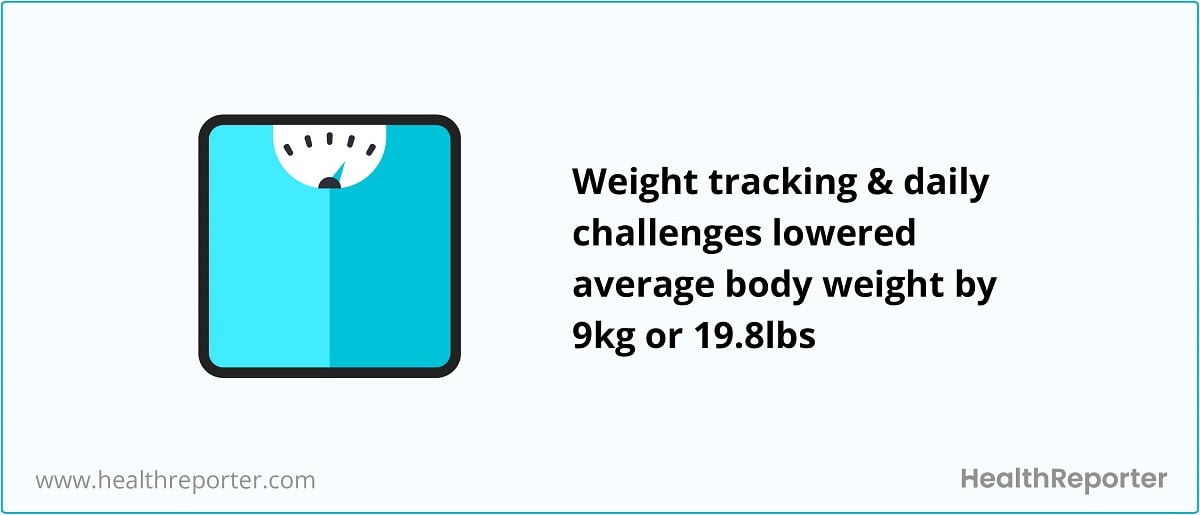
Within fasting apps, there are a variety of features that help you reach your weight loss goals faster. Below, we look at which features contributed to the greatest amount of lost weight.
One extra hour of fasting gave approximately 3kgs or 6.6lbs of lost weight each month, worked out with the formula (28g x 4hours) x 7days = 784g per week, times by 4 weeks = 3.136kg or 6.9lbs – this is a base figure that can be used for comparison against in-app features.
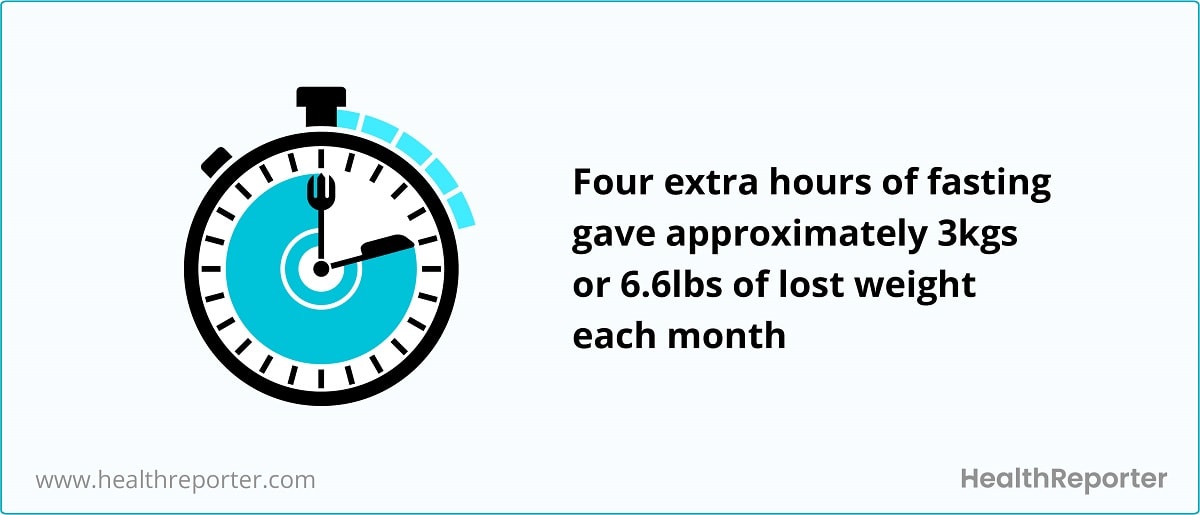
Weight tracking and completing daily challenges further significantly lowered the bodyweight by an additional 9kgs or 19.4lbs over the course of the study. Other activities also statistically significantly lowered body weight.
A multiple regression model showed that total length of use and active days were the most significant predictors of weight loss. In-app activities such as total fasting hours, weight logging, completing challenges, and providing feedback were also statistically significant predictors of weight loss with varying contributions.
2. 32.8% of fasting app users were able to lower their Body Mass Index (BMI)
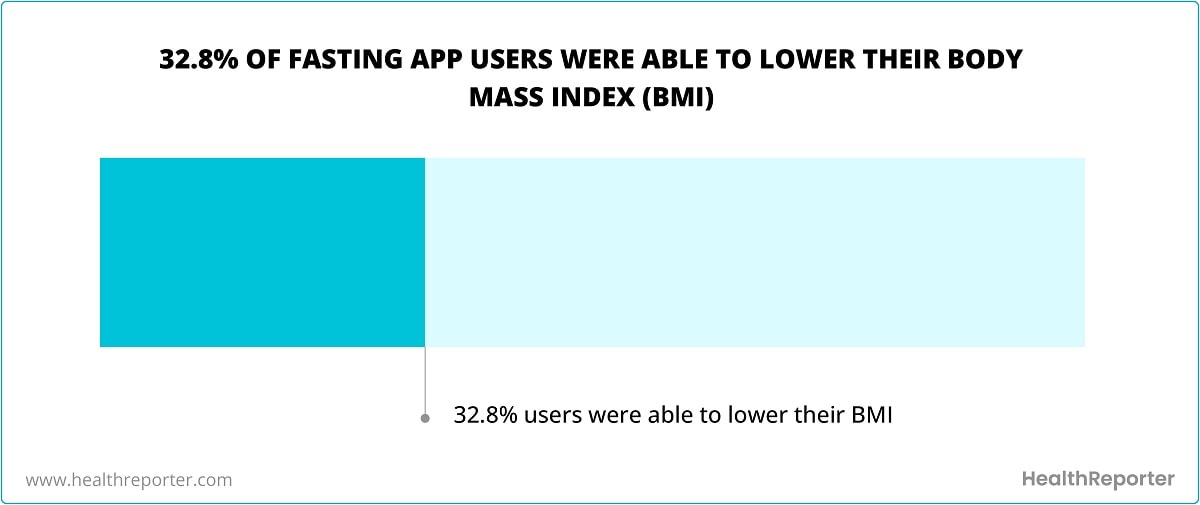
We found that 2842 users (15.3%) in the short-term group lowered their BMI level, compared to 1666 users (32.8 %) in the long-term group. 1
The same tendency was observed with non-active vs active users.
There was a statistically significant difference in proportion between non-active and active users in terms of BMI level reduction (14.7% vs 21.6%).
Moreover, 12% of users managed to reduce their initial BMI level from obese or overweight to normal.
3. Starting and final body weights of fasting app users
Those deemed as overweight (according to their BMI at the start of the testing) were split into active and non-active groups. The median starting weight for an active user was 91.6kg or 201.9lbs, with the final weight being measured around 30-90 days later at 89.1kg or 196.4lbs – a total weight loss of 2.5kg or 5.5lbs.
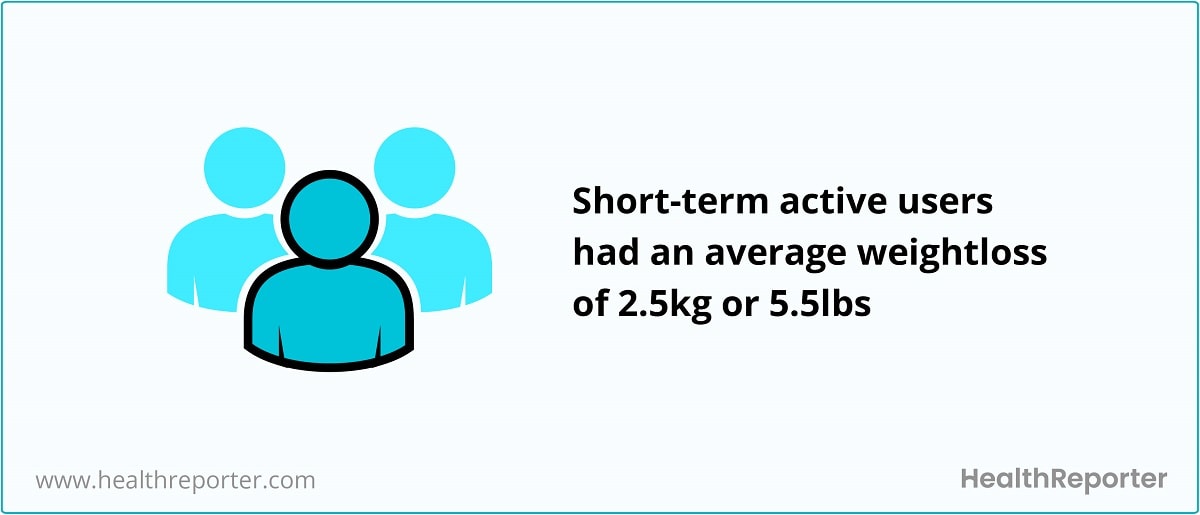
Whereas non-active users’ median starting weights were 90.7kg or 199.9lbs, with their end weight in the same time period now 89.6kg or 197.5lbs – a total weight loss of 1.1kg or 2.4lbs.
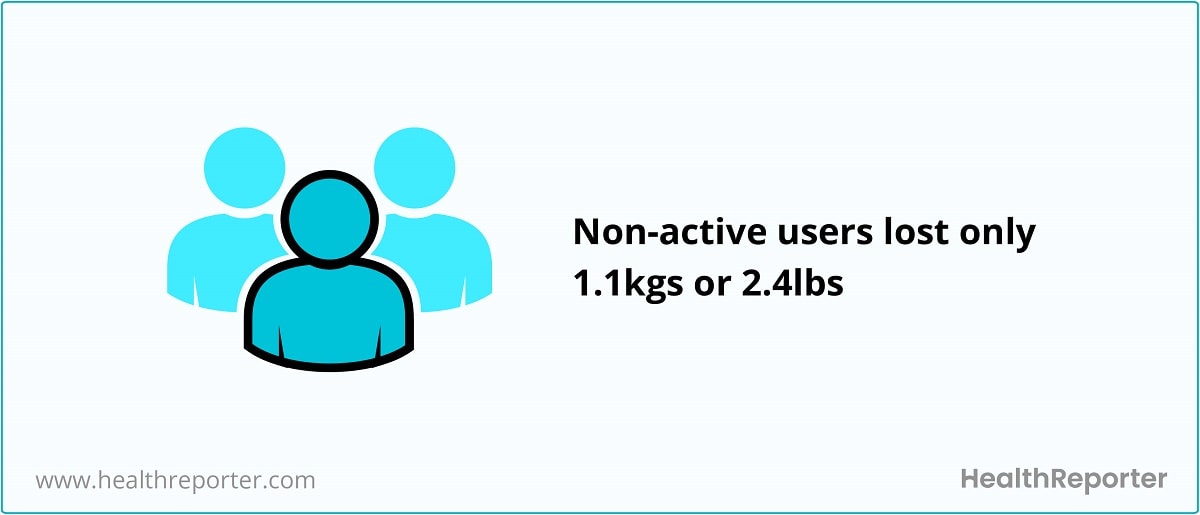
So both groups lost weight in a short space of time, but the active users show that the implication of regular use of fasting applications, has a greater impact on the ability to lose weight.
4. 12.8% of people said losing weight was the most common pain point of weight management
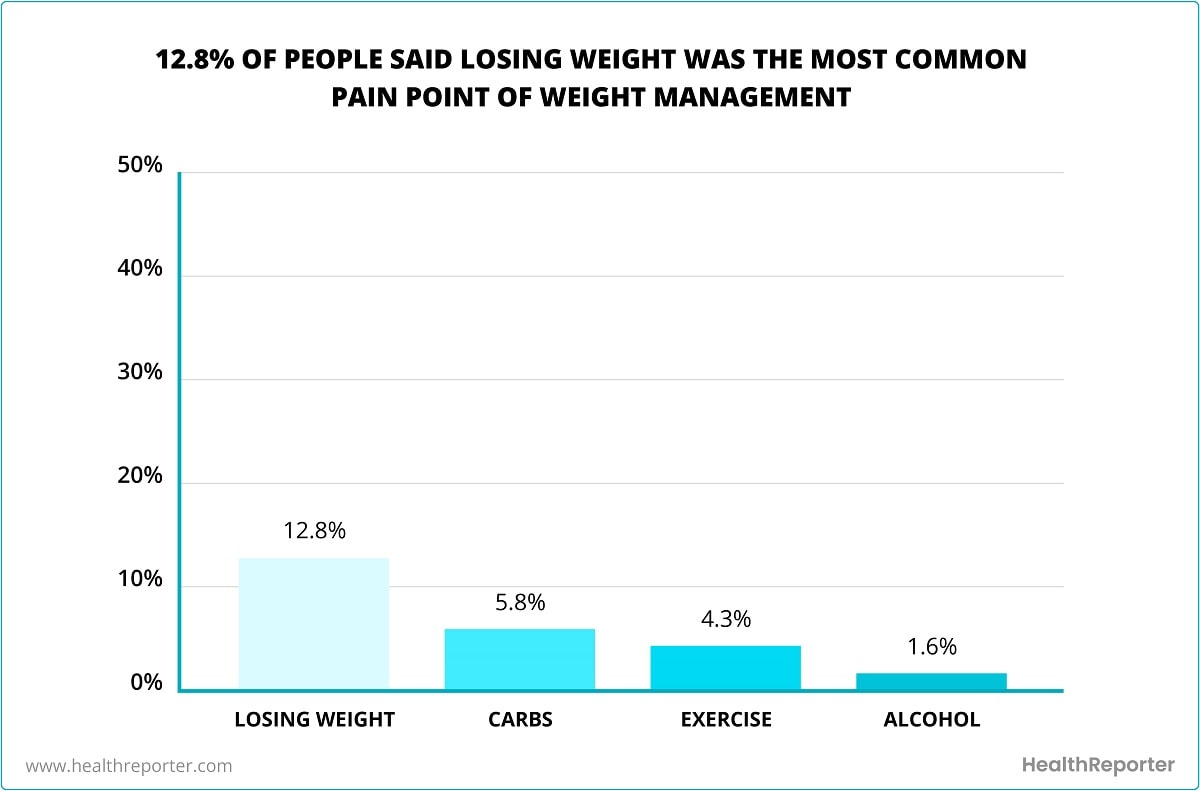
The main pain point for this group was not being able to lose weight, with 12.8% of people opting for this answer.
Many stated that they did not think they could lose the weight they desired, with the amount either being too high or unrealistic. Keeping the weight off was another common issue answer, a real pain point for those looking to lose weight.
The joint second pain point was motivation and carbs, with 5.8% of users picking this option.
This suggests that people simply do not have the motivation to start a diet, with some mentioning previous failed attempts or not having the time to focus on dieting.
There were various mentions of diets not fitting into the lifestyle they lived, as having a social life of going to restaurants and bars can often lead to excessive calorie intake.
Other common pain points included alcohol, with users suggesting that too many calories are wasted on this, to make weight management a viable option – 1.6% of people had alcohol listed as a pain point.
It was suggested by some that they drink too many calories for a diet to ever be viable, and feel as though this would be hard to give up.
Drinking, in particular pints, consumes a large number of calories, without offering any health benefits. Even the healthiest looking individuals can go over their recommended daily calorie intake by drinking too often. This leads to an unbalanced diet.
4.3% of users stated that having the time to exercise was a big problem, with the same percentile also stating that meal preparation is another issue.
For people who work full-time jobs, finding the time to work, socialize, exercise, and plan meals is simply not viable, with downtime being an important factor. Users identified that certain meals plans are expensive and simply do not fit their taste, with many not wishing to splash the cash over fears they simply will not like the food.
5. 48.1% of people don’t purchase fasting apps due to the price
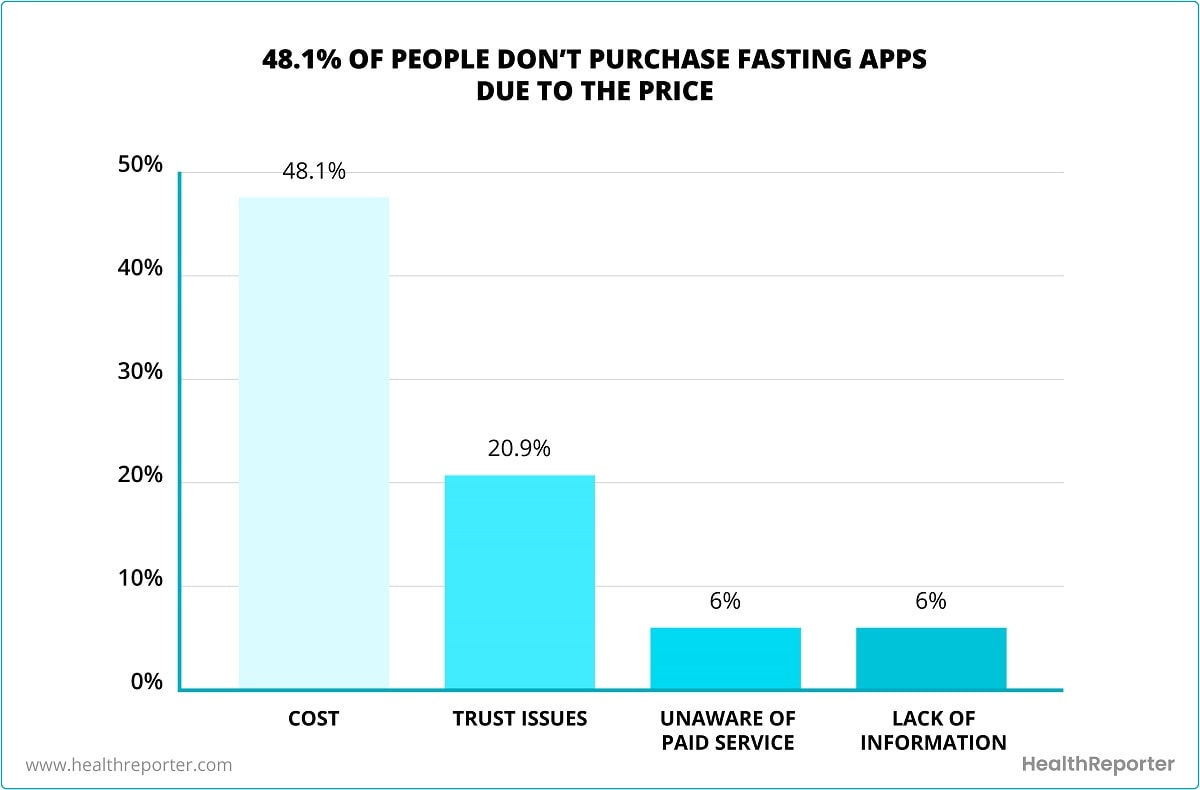
The cost of fasting apps is the major pain point for people, with 48.1% of users listing the price as an issue. Some users stated that they feel as though they could do the work themselves, without having to pay a fee for an app.
Other users echoed these thoughts, with many stating they did not see any value in the apps, saying that they already do this themselves, so this would just be an unnecessary cost. Some, simply could not afford the extra expenditure, even if they would like to.
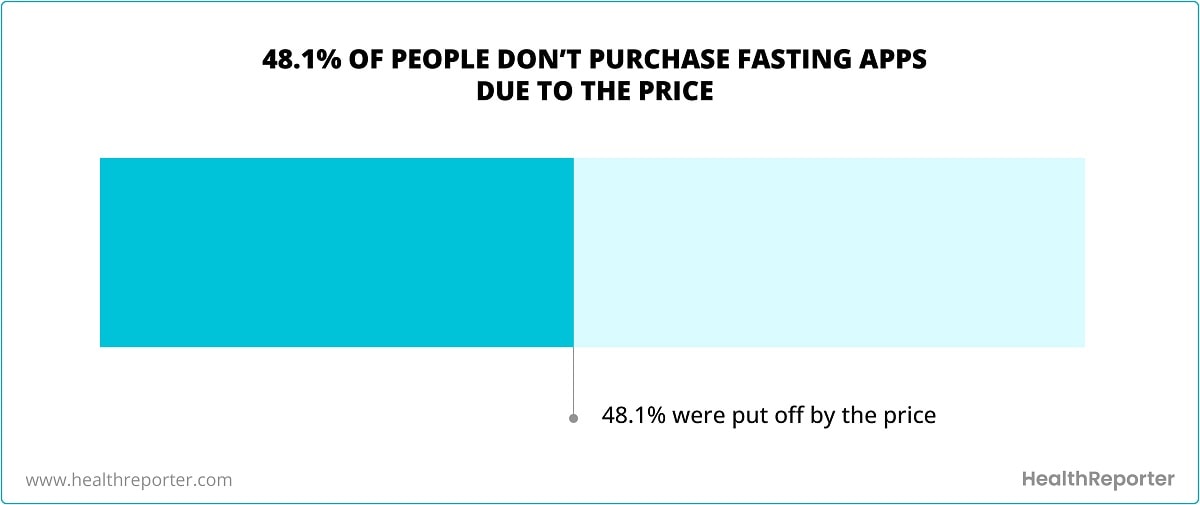
The second most popular occurring pain point was trust issues, with 20.9% of people saying they were not entirely sure about the credentials, or how truthful the information they received was. There is always a grey area with consumers looking for health and wellness products, with such a crowded market of competitors to choose from.
6% of users mentioned that there were no clues to these apps being a paid service, until the last minute, when they were asked to sign up for plans. Many believe this was an untrustworthy move to make, as they had already invested time into research and answering quizzes.
They also thought that at times, there was a lack of information available to them, with 6% of users mentioning this as a problem, this added further trust issues. A free trial would have eased the minds of some, who feel it is unfair to charge early on, as it simply may not work for them, and they are unwilling to part ways with their money for a service that may do them no good.
6. 27.2% of people said eating habits were the most common weight management pain point
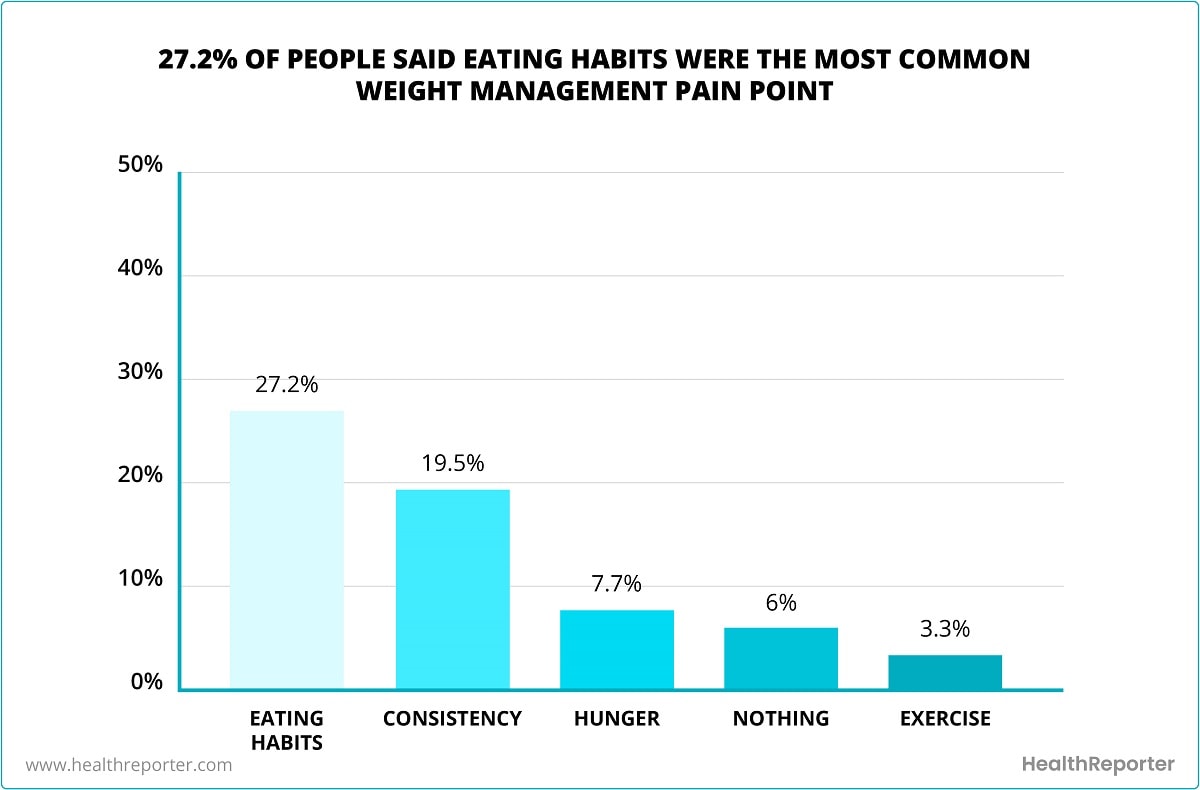
A large majority of people also had reservations about whether an app could help them escape their previous eating habits. Consistency was another common issue with 19.5% of people referencing this in their answers.
Many believed they could start off well but would struggle to stick with fasting – even with the aid of an app.
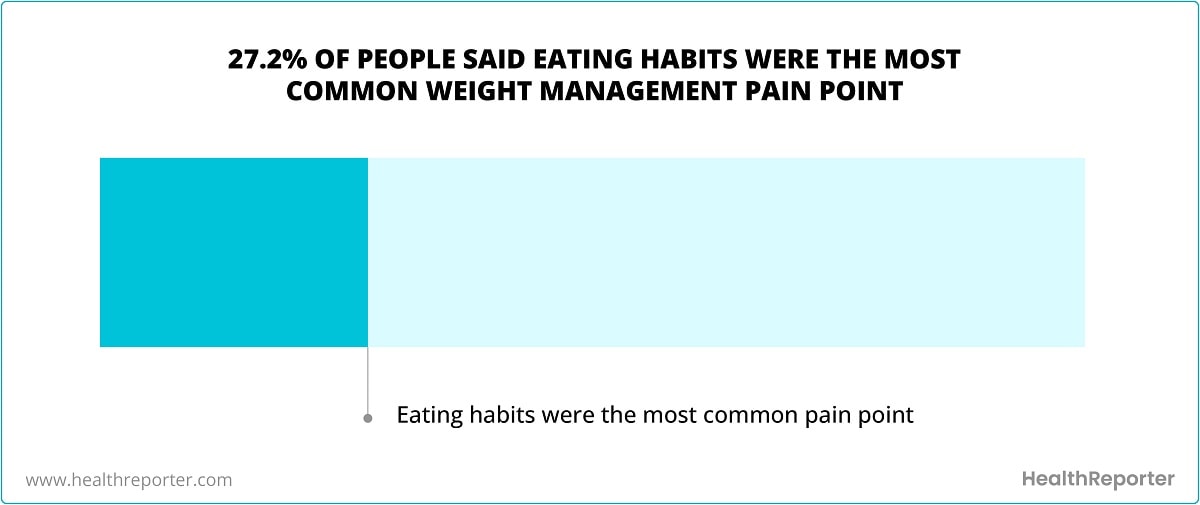
Most answers included consistency as a pain point, from varying factors such as self-discipline or maintaining the effort. This seems to be a shared view from many buyers, resisting food and sticking with a diet can be tricky for anyone.
7.7% of users said that hunger would be a big issue for them, with many believing that fasting would leave them feeling ravenous.
To go long periods without eating is new for people, and many often turn to snacking when they are hungry, which takes them over their recommended daily calorie limit.
Other popular pain points included exercise, at 3.3% – the age-old problem of dieting, as well as finding the time to squeeze in a workout. However, over 6% of people listed nothing as an answer, suggesting that it is not impossible.
7. 22.4% of people said they had no hesitations before buying a fasting app
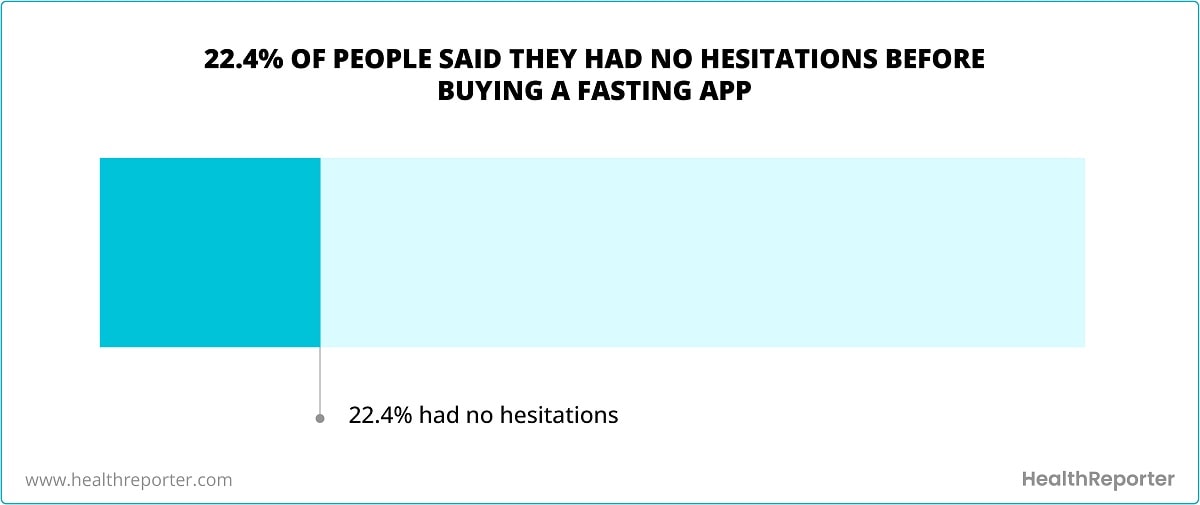
The most common answer shows that people would have no hesitations before buying a subscription or one-off payment for a fasting app. This seems to suggest that they believe such a tool would be highly beneficial for them.
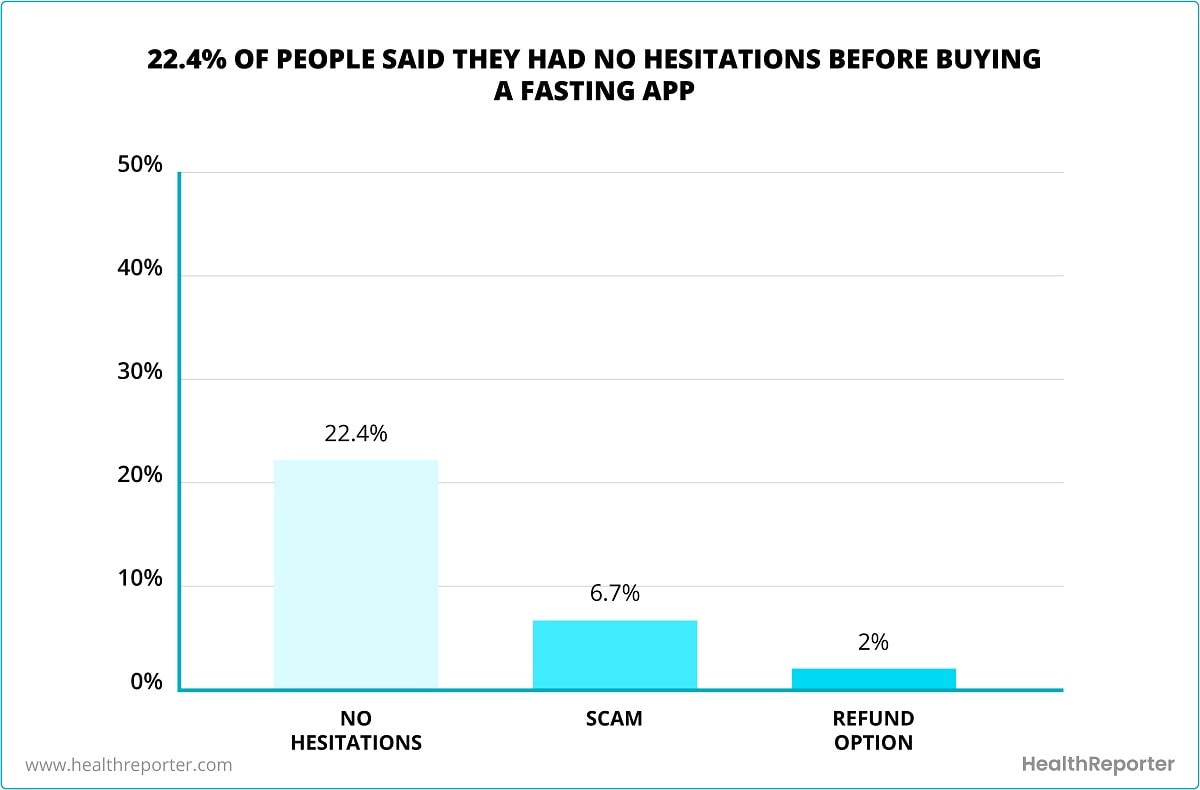
However, the most common hesitation as to why they would not proceed, was will it work? Simply, is this the right way for them to fast? Before spending money and committing to a service, you want to know if it will give you the desired results.
Some touted a lack of research or knowledge of apps and how they help under the same issue. They may not have time to look into the background work that goes into making such an application, and what experts were included in making it.
Other common hesitations were scam-related, with 6.7% unsure of how legit these apps were. People referred to them as offering so much, but without a lot of real data to back it up. Others took to trust review platforms to see how it worked, with mixed results and answers, but they remained skeptical of them.
Under 2% of users would have liked a refund option if the app did not work – as committing to a long or short-term plan comes with its potential financial risk. They suggested that they would be more likely to sign up if companies offered a money-back option for undesired results.
8. Over 24% of people said that hunger was their most common concern regarding intermittent fasting
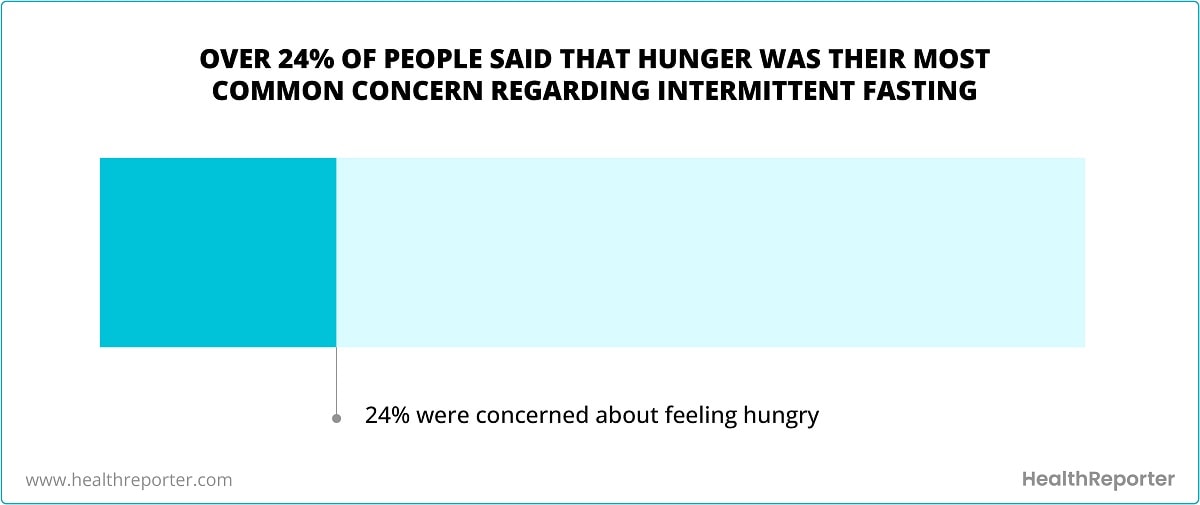
24.1% of people said that they believe they would struggle with being hungry, were they to try intermittent fasting. Going for prolonged periods without eating is difficult, especially if you are new to it. They mentioned that they fear they would over-eat during the time period they were allowed food, which counter the actual point of fasting.
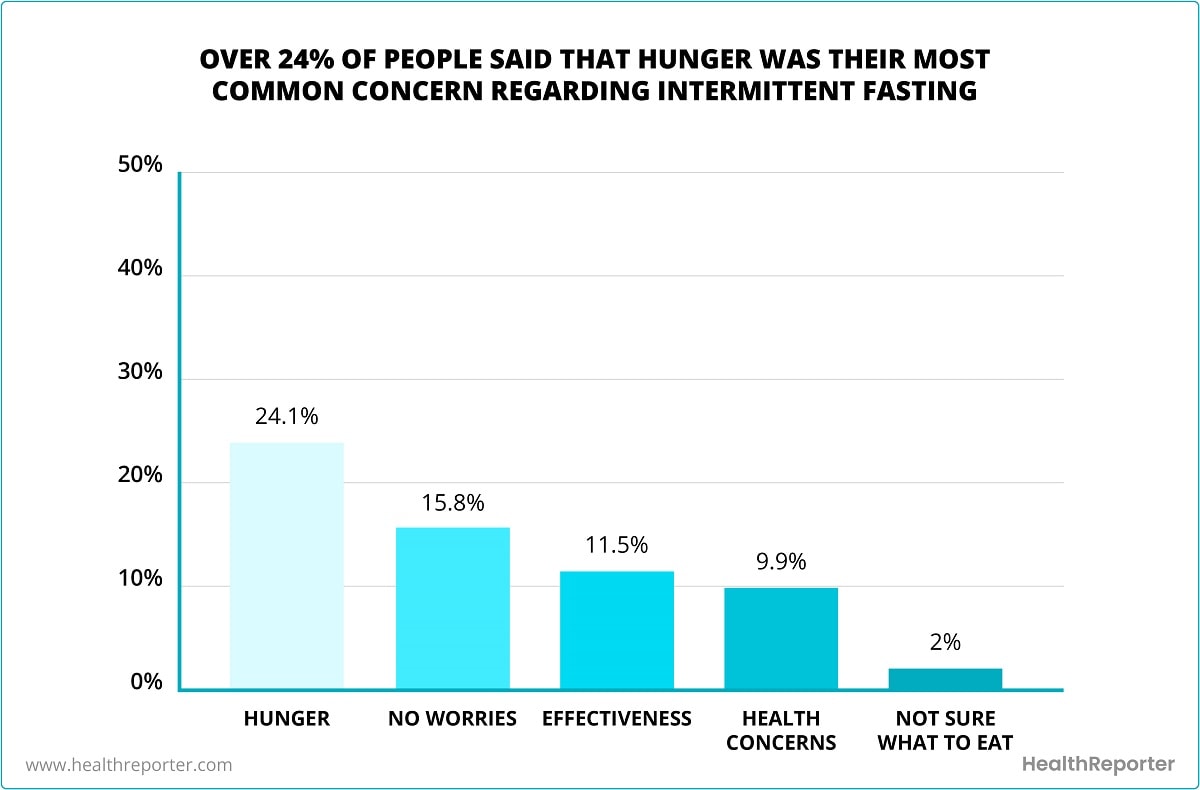
15.8% of people had no worries about intermittent fasting, this was the second-highest amount recorded. Health concerns also scored highly, with 9.9% of people stating some fears that their health could be affected by the prolonged periods of fasting. Others said they could overcome this if they were to do their own research beforehand.
Other popular opinions included effectiveness, with 11.5% of people stating they would worry about how fasting would work for them. Everyone loses weight in different ways, and it is about finding the best way for yourself. They expressed concerns about whether they were actually fasting correctly – as it is easy to lose track of what you might have eaten, and when.
2% of people were not sure what to eat during their allocated window. If you eat junk food and sweets during this period, you are very unlikely to lose weight. You must still maintain a balanced diet to get the full impact of fasting.
9. 16% of people said they had never tried another weight loss solution
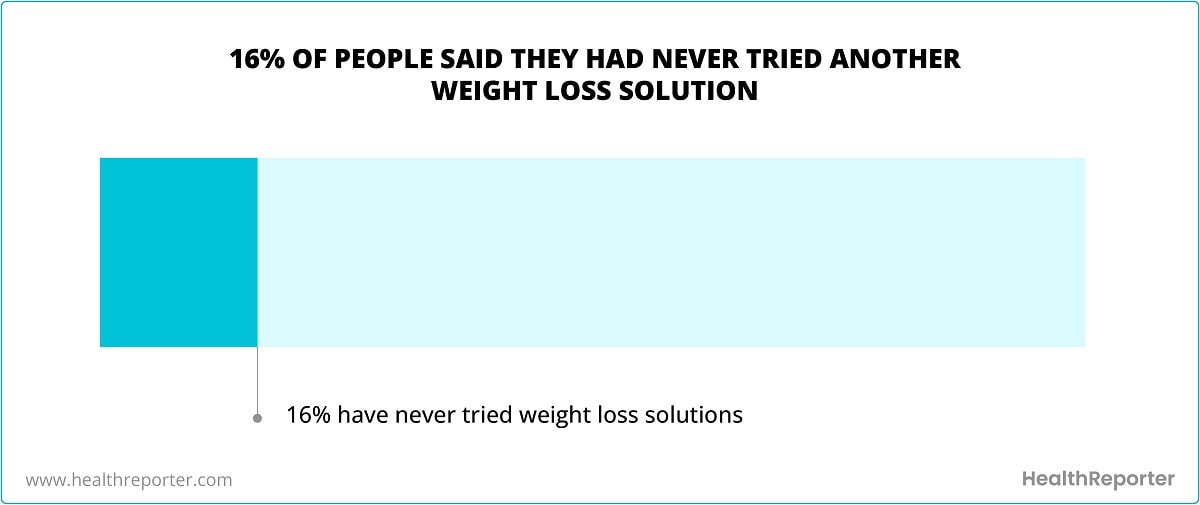
This could point to the hesitations referenced earlier, those who have never tried to lose weight before, have reasons to be skeptical about fasting, or any other method of dieting.
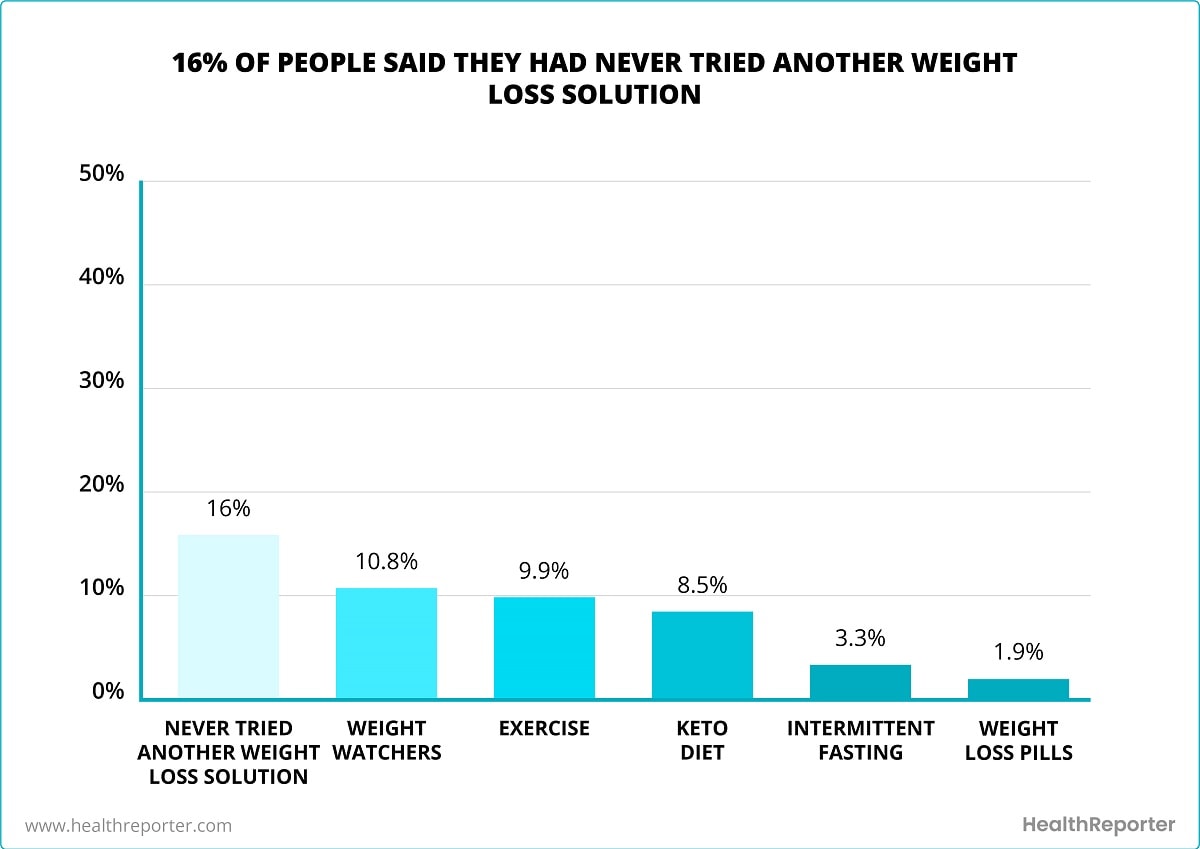
In comparison, 9.9% of people said they tried exercise – this is more common as it can be done with limited resources, with people saying they did not want to spend money on other solutions when they can go outside and do it for free, or from the comfort of their home.
The most common diet solutions provided by external sources were Weight Watchers at 10.8% and the keto diet also scoring high at 8.5%.
Users mentioned that Weight Watchers can be an expensive way to lose weight, whereas keto users pointed to how difficult the keto diet can be for people, but praised the fast and good results that come alongside it.
Weight loss pills or supplements came in at 1.9% of users. Many expressed reservations about these, as they always promise so much, with limited background research. Intermittent fasting was selected by 3.3% of people, with answers including those who needed to regain more control over what they ate, but others said they struggled with the time period of fasting.
10. 25% of people said they chose intermittent fasting apps as they wanted a different approach to weight loss
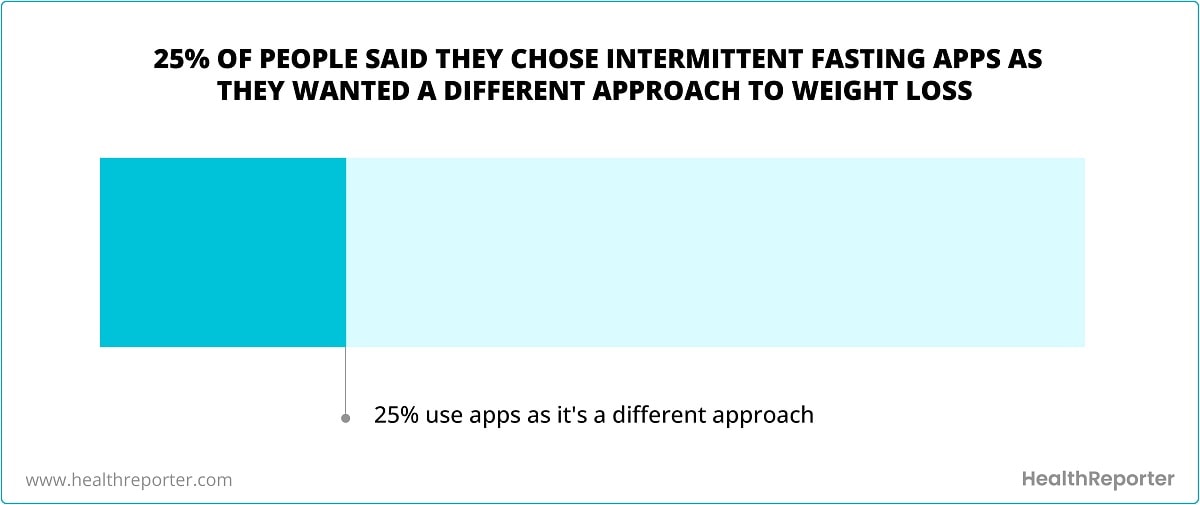
A quarter of users – 25%, said a new approach was what inspired them to try fasting apps. They mentioned the convenience of having something easily accessible, which did a lot of the hard work for you, as a driving factor.
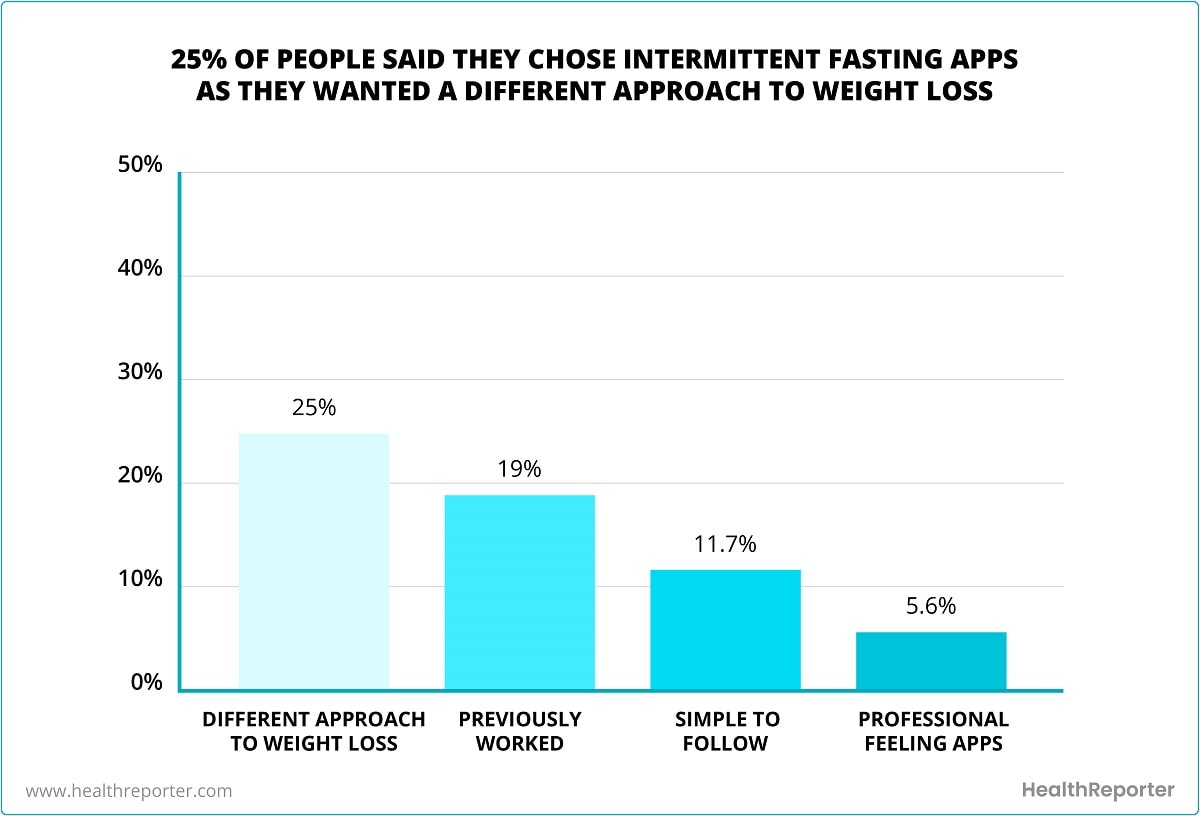
They also spoke about the lack of needing to change your diet too drastically, with fasting allowing you to eat as you may usually, but with a long period without eating.
Once you get used to the longer periods without food, fasting really comes into its own, one user said, it is more about discipline than it is dieting, which seems less daunting for some.
The second most common reason for trying IF apps were users who found that intermittent fasting had worked for them in the past, with 19% of people expressing this. They thought that it helped them lose weight without an app, so having one would make things easier to handle. Counting calories and monitoring progress are simpler this way.
Several users mentioned that their doctors specifically recommended that they try intermittent fasting, and pointed them in the direction of these apps. Some even took matters into their own hands, and researched themselves, with many sources citing IF apps as being an effective way to lose weight and stay on top of your fasting.
Other popular answers included 11.7% of people choosing ‘simple to follow’ – the ease and accessibility of apps are often unrivaled when dieting. 5.6% of people said that the apps were often very thorough and designed by experts, so it eased their minds.

















































 Select your language:
Select your language: 







